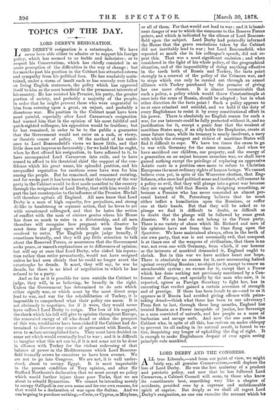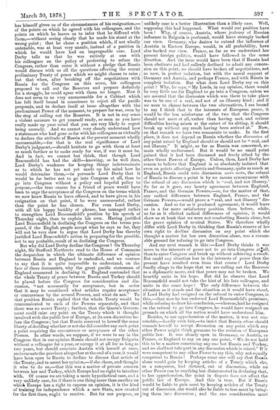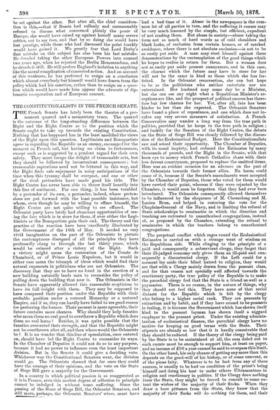LORD DERBY AND THE CONGRESS. A LL true Liberals,—and from our
point of view, we might fairly say, all genuine Conservatives,—will deplore the loss of Lord Derby. He was the last mainstay of a prudent and patriotic policy, and now that he has followed Lord Carnarvon, a Cabinet Council will seem, to those who know its constituents best, something very like a chapter of accidents, presided over by a supreme and unfathomable spirit of caprice. But deeply as we shall all regret Lord Derby's resignation, no one can examine the account which he not to say probable, result of so declining the Congress. able ground for refusing to go into Congress.
But why did Lord Derby decline the Congress ? On Thursday And our next remark is this :—Lord Derby thinks it was night, Sir Stafford Northcote read to the House of Commons more in the interests of peace not to go into Congress atiall, the despatches in which the ultimate difference of opinion than to enter Congress and break up without achieving a result. between Russia and England is embodied, and we venture But could any situation less in the interests of peace than the to say that it is quite impossible to understand, on the present have resulted even from that course ? Lord Derby face of these documents, why the great pacific statesman of fondly clings to the hope that we are calling out the Reserves England concurred in declining it. England contended that as a diplomatic move, and that peace may not be broken. We the whole Treaty of peace between Russia and Turkey should heartily unite in his hope. But did he observe that Lord be placed before the Congress for consideration and dis- Beaconsfield would not take the hint of his late colleague, and cussion, "not necessarily for acceptance, but in order unite in the same hope ? The only difference between the that it may be considered what articles require acceptance situation as it stands and the situation as it would have stood, or concurrence by the several Powers, and what do not." To if Lord Derby had resigned on the refusal to enter Congress, is that position Russia replied that the whole Treaty would be this,—that now he has endorsed Lord Beaconsfield's premisses, communicated to each of the Powers separately, and that while refusing to draw his conclusion,—whereas,had he resigned there was no secret Treaty ; further, that the Queen's Govern- on the refusal to go into Congress, he would have resigned on ment could raise any point on the Treaty which it thought grounds on which all the nation would have understood him.
involved with the public law of Europe, at its own discretion be- Besides, to our apprehension of the matter, it was not rea- fore the Congress ; but that Russia reserved to herself the same sonable,—hardly even fair,—to insist that Russia alone should liberty of deciding whether or not she did consider any such point commit herself to accept discussion on any point which any a point requiring the concurrence or acceptance of the other other Power might think germane to the revision of European Powers. In other words, we suppose, if we were to say in the public law. It was clearly open to Germany, or Austria, or Congress that in our opinion Russia should not occupy Bulgaria France, or England to say on any one point, " We do not hold without a colleague for a year, or occupy it at all for so long as this to be a matter concerning any one but Russia and Turkey, two years, but should associate Austria with herself at once, and we shall not take part in any discussion which is raised." If it and evacuate the province altogether at the end of a year, it would were competent to any other Power to say this, why not equally have been open to Russia to decline to discuss that article of competent to Russia ? Perhaps some one will say that Russia the Treaty, and to assert her opinion,—if she chose, and thought alone would gain by keeping articles of a Treaty which she, it wise to do so,—that this was a matter of private concern as a conqueror, had dictated, out of discussion, while no between her and Turkey, which Europe had no right to interfere other Power can be anything but disinterested in declaring that, with. Of course we are taking a mere hypothetical case, and a to her apprehension, the point in dispute does not affect the very unlikely case, for if there is one thing more than another on public law of Europe. And this is true. But if Russia which Europe has a right to express an opinion, it is the kind would be liable to gain most by keeping articles of the Treaty of training for independence which a new State, now created out of discussion, she would also be liable to lose most by bring- for the first time, ought to receive. But for our purpose, an ing them into discussion ; and the one consideration must has himself given us of the circumstances of his resignation,— unlikely case is a better illustration than a likely case. Well, of the points on which he agreed with his colleagues, and the supposing this had happened. What would our position have points on which he leaves us to infer that he differed with t been ? Why, of course, Austria, whose jealousy of Russian them,—without seeing clearly that he made his stand at the influence in Bulgaria is profound, would have strongly backed wrong point ; that he chose a position which, if not wholly our view. Germany, who desires to extend the influence of untenable, was at least very unsafe, instead of a position in Austria in Eastern Europe, would, in all probability, have which he would have had an impregnable case. Lord also backed our view. France, so far as we understand her Derby tells us that he was entirely at one with present foreign politics, would have followed in the same his colleagues on the policy of preferring to refuse the direction. And the issue would have been that if Russia had Congress, rather than enter it without a pledge that Russia been obstinate and had sullenly declined to admit any conces- would discuss with us all the questions affecting the recent sion on this point, we should have broken off negotiations, not preliminary Treaty of peace which we might choose to raise ; as now, in perfect isolation, but with the moral support of but that when, after breaking off the negotiations with Germany and Austria, and perhaps France, and with Russia in Russia for the Congress on this score, his colleagues complete isolation. But what does Lord Derby say on this proposed to call out the Reserves and prepare definitely point ? Why, he says, "My Lords, in my opinion, there would for a struggle, he could agree with them no longer. Now it bo very little use for England to go into a Congress, unless we does not seem to us very unreasonable for a Cabinet which are assured that the discussion which was there to take place has felt itself bound in conscience to reject all the pacific was to be one of a real, and not of an illusory kind ; and if proposals, and to declare itself at issue altogether with the we were to choose between the two alternatives, I am bound predominant Power of the moment, to prepare for war, even by to say I think that in the interests of European peace, it the step of calling out the Reserves. It is not in any sense would be the less misfortune of the two that the Congress a violent measure to get yourself ready, so soon as you have should not meet at all, -rather than having met, and serious really made up your mind that you are very likely to regret difficulties having arisen at the outset of its sitting, it should being unready. And we cannot very clearly understand how break up without any result having been arrived at." Now, a statesman who had gone so far with his colleagues as virtually on that remark we have two comments to make. In the first to declare the attitude of Russia at the present moment wholly place, it does not depend on Russia whether the discussion of unreasonable,—for that is the real significance of Lord any point raised by England should or should not be " real, and Derby's judgment,—should hesitate to go with them at least not illusory." It might, so far as Russia was concerned, re- so much further as to make ready for war, if war it must be. main wholly undiscussed. But it would be no small point And in fact, we cannot but think, that though Lord gained that it had been discussed and freely sifted by the-- Beaconsfield has had the skill—knowing, as he well does, other Great Powers of Europe. Unless, then, Lord Derby has Lord Derby's weakness for keeping things indeterminate reason to believe that England is so absolutely isolated that as to which he has not yet made up his mind how he even on points affecting Austria and Germany, quite as much as would determine them,—to persuade Lord Derby that it England, Russia could veto discussion niero motel, the refusal would be far better not to go into Congress at all, than to of Russia to discuss a point is by no means synonymous with go into Congress without a policy and hopeful policy to the refusal of any discussion which is real, and not illusory? propose,—the true course for a friend of peace would have So far as it goes, any hearty agreement between England, been to urge the acceptance of the Congress on the terms which France, and the German Powers,—or, for the matter of that, we now know Russia to have offered, and to have given in his any radical difference between England, France, and the resignation on that point, if he were unsuccessful, rather German Powers,—would prove a "real, and not illusory" dis- than the point he has chosen. For even Lord Derby, cussion. And so far as it produced agreement, it would leave with all his happy lucidity of phrase, has managed rather us in a far more satisfactory position than before, while, to strengthen Lord Beaconsfield's position by his speech of so far as it elicited radical differences of opinion, it would Thursday night, than to explain his own. Having justified show us at least that we were not combatting Russia alone, but Lord Beaconsfield in declining the Congress on the terms pro- the grave opinion of neutral States. We therefore wholly posed, if the English people accept what he says so far, they differ with Lord Derby in thinking that Russia's reserve of her will not be very slow to argue that Lord Derby has thereby own right to decline discussion on any point which she justified Lord Beaconfleld's action in preparing for the possible, thought a matter for her own discretion alone, was a reason- But why did Lord Derby decline the Congress ? On Thursday And our next remark is this :—Lord Derby thinks it was night, Sir Stafford Northcote read to the House of Commons more in the interests of peace not to go into Congress atiall, the despatches in which the ultimate difference of opinion than to enter Congress and break up without achieving a result. between Russia and England is embodied, and we venture But could any situation less in the interests of peace than the to say that it is quite impossible to understand, on the present have resulted even from that course ? Lord Derby face of these documents, why the great pacific statesman of fondly clings to the hope that we are calling out the Reserves England concurred in declining it. England contended that as a diplomatic move, and that peace may not be broken. We the whole Treaty of peace between Russia and Turkey should heartily unite in his hope. But did he observe that Lord be placed before the Congress for consideration and dis- Beaconsfield would not take the hint of his late colleague, and cussion, "not necessarily for acceptance, but in order unite in the same hope ? The only difference between the that it may be considered what articles require acceptance situation as it stands and the situation as it would have stood, or concurrence by the several Powers, and what do not." To if Lord Derby had resigned on the refusal to enter Congress, is that position Russia replied that the whole Treaty would be this,—that now he has endorsed Lord Beaconsfield's premisses, communicated to each of the Powers separately, and that while refusing to draw his conclusion,—whereas,had he resigned there was no secret Treaty ; further, that the Queen's Govern- on the refusal to go into Congress, he would have resigned on ment could raise any point on the Treaty which it thought grounds on which all the nation would have understood him.
involved with the public law of Europe, at its own discretion be- Besides, to our apprehension of the matter, it was not rea- fore the Congress ; but that Russia reserved to herself the same sonable,—hardly even fair,—to insist that Russia alone should liberty of deciding whether or not she did consider any such point commit herself to accept discussion on any point which any a point requiring the concurrence or acceptance of the other other Power might think germane to the revision of European Powers. In other words, we suppose, if we were to say in the public law. It was clearly open to Germany, or Austria, or Congress that in our opinion Russia should not occupy Bulgaria France, or England to say on any one point, " We do not hold without a colleague for a year, or occupy it at all for so long as this to be a matter concerning any one but Russia and Turkey, two years, but should associate Austria with herself at once, and we shall not take part in any discussion which is raised." If it and evacuate the province altogether at the end of a year, it would were competent to any other Power to say this, why not equally have been open to Russia to decline to discuss that article of competent to Russia ? Perhaps some one will say that Russia the Treaty, and to assert her opinion,—if she chose, and thought alone would gain by keeping articles of a Treaty which she, it wise to do so,—that this was a matter of private concern as a conqueror, had dictated, out of discussion, while no between her and Turkey, which Europe had no right to interfere other Power can be anything but disinterested in declaring that, with. Of course we are taking a mere hypothetical case, and a to her apprehension, the point in dispute does not affect the very unlikely case, for if there is one thing more than another on public law of Europe. And this is true. But if Russia which Europe has a right to express an opinion, it is the kind would be liable to gain most by keeping articles of the Treaty of training for independence which a new State, now created out of discussion, she would also be liable to lose most by bring- for the first time, ought to receive. But for our purpose, an ing them into discussion ; and the one consideration must be set against the other. But after all, the chief considera- tion is this,—that if Russia had sullenly and unreasonably refused to discuss what concerned plainly the peace of Ihirope, she would have raised up against herself many severe critics, not to say foes, and that by so doing she would have led prestige, while those who had discussed the point frankly would have gained it. We greatly fear that Lord Derby's first mistake on this subject has also been his last mistake. He dreaded taking the other European Powers into counsel two years ago, when he rejected the Berlin Memorandum, and he dreads it still. He still prefers England's isolation to anything like the moral complication of concerted action. And on account of this weakness, he has preferred to resign on a conclusion which almost everybody but himself would have drawn from the policy which had his sanction, rather than to resign on a ques- tion which would have made him appear the advocate of dip- lomatic co-operation and of European concert.




































 Previous page
Previous page